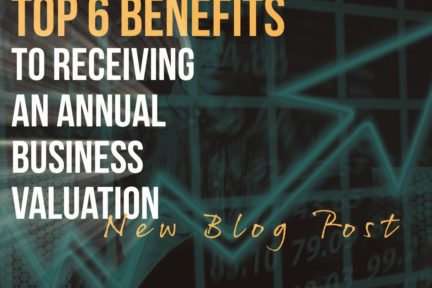After the most unsettling, unpredictable, and economically disastrous period since the Great Depression, the necessity of assessing the value of your business has never been more important. The importance of having a business valuation performed when selling a business is evident, but have you ever contemplated the benefits of having a clear picture of your business’ value, year after year? This article will outline the top 6 reasons you should consider receiving an annual business valuation.
- Obtain Market Value
Any business owner may have an idea about what their business is worth, depending on various financial factors they may utilize. Valuation experts, on the other hand, employ a multitude of financial variables to create a multifaceted report for the business owner to utilize as they see fit. Obviously, an owner would not want to sell something they had no idea the value of. However, obtaining the market value of your business has many uses beyond the actual sale of your business. Obtaining a year after year valuation allows you to compare where your business lies next to the competition, what trajectory your business is on, and leverage in business dealings.
- Risk Assessment
Risk mitigation is at the forefront of any business, despite its size. Decisions are often made in response to the best strategy to manage that risk. An annual business valuation can provide vital guidance to avoid and minimize risk. More information about long-term, depreciating assets, and the solvency ratio of the business can provide perspective on how much debt the business can take on. Without an annual valuation, determining the true accuracy of financial risks can be difficult. Utilizing the valuation can determine how risk averse the business can operate in the future.
- Provide Assurance to Stakeholders
No matter your position in the company, whether it be CEO, investor, or employee, the financial health of the company affects all, top to bottom. The security of a verified business valuation gives assurance to the people in the company that rely on it for their livelihoods. Specifically, investors and stakeholders are hard to garner without solid information regarding how their money is to be used. This information about the financial health of the company can also forecast how to increase stakeholders’ commitment, creating further stability for the company. By obtaining an annual business valuation, your stakeholders can attain a higher level of confidence in the transparency you provide them.
- Expand Potential Investors
Company growth requires funding, and funding requires investors. When reaching out to these potential investors, often, a business valuation is a prerequisite to any investor dealings. These investors want to see beyond a simple valuation number, they want to see how the money is moving in the business and where their money would be spent if they choose to invest. If they can see how that money is moving, and where their profit lies, they are more likely to consider your business for investment. Having a comprehensive business valuation will allow the owner to understand where most of the value is coming from and have solid ground to stand on when going and looking for investors to bring their company to higher levels of capital.
- Measure Business Performance
A business valuation draws upon many data points to paint the overall monetary picture of your business. This picture allows you to see how your business stacks up against competitors, and how to better position your business for growth and investment. If your business is overachieving in one area, but lacking in another, the business valuation will allow you to analyze why those areas are under or overperforming and adjust accordingly.
- Estate and Gift Tax Purposes
The gift tax and the estate tax, often referred to as the “death tax”, must be considered in conjunction with one another when developing a strategy and plan for an estate. However, there is a very subtle but clear difference between the two taxes and demands very close attention. When there is a transfer of wealth between an estate and various beneficiaries, the identified contrast between the two taxes makes all the difference.
On the date of death, the estate “death” tax is paid according to the fair market value of the decedent’s asset holdings within the estate. Financial, accounting, and valuation professionals are needed to make this happen. An accounting or valuation professional will analyze assets and liabilities, inventory and hard assets, financial related documents, and in turn place a value on the estate holdings. When the probate court and executor of the estate have come to an agreement on the estate value, it is then reported to the IRS on Form 706. Having valuations completed on an annual basis allows estates to eliminate confusion upon death by keeping asset listings, inventory, and estate value up to date.
Schedule a Business Valuation Today
An annual business valuation is an unmistakable part of any successful business. If your business has not had one in over a year, now would be the opportune time to schedule one. It’s a certain method to ascertain where your business stands in these uncertain times. Contact Intellex Forensics to set up your business valuation.
